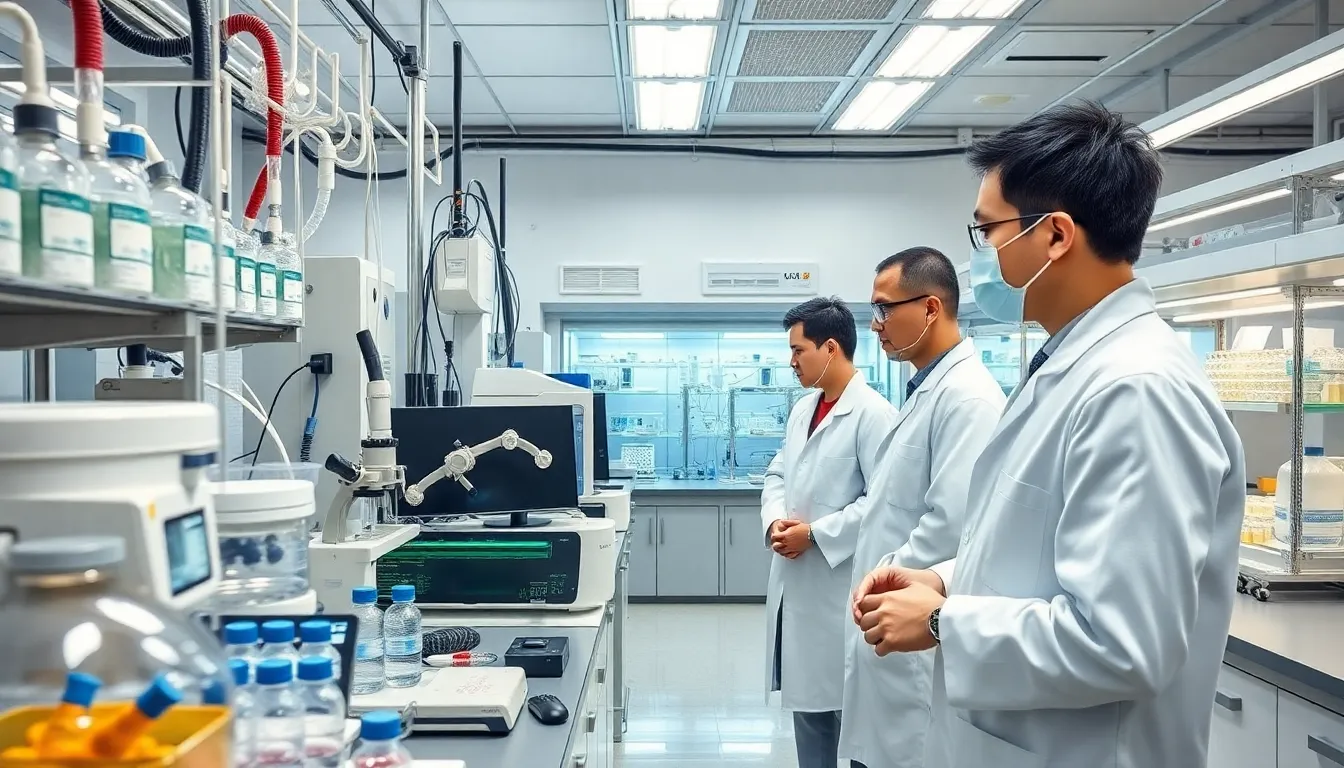Table of Contents
ToggleChina’s biotech industry is like a thrilling roller coaster ride—fast-paced, innovative, and full of surprises. With its rapid advancements in genetic research and pharmaceuticals, the country is becoming a global powerhouse in biotechnology. Whether it’s developing groundbreaking therapies or pioneering agricultural solutions, China’s biotech scene is buzzing with potential that could change the world.
Overview of China Biotech
China’s biotech industry showcases remarkable growth, marked by advancements in diverse areas, including genetic engineering and pharmaceuticals. The country invests heavily in research and development, leading to breakthroughs in areas such as gene editing and personalized medicine. Innovation flourishes within various sectors, including agriculture, where biotech solutions enhance crop yields and resistance to pests.
Numerous companies drive this surge in biotechnology. Enterprises like WuXi AppTec and BGI Group are recognized leaders in drug development and sequencing technologies. Collaborations between academia and industry foster an environment conducive to groundbreaking discoveries. These partnerships enable universities to contribute to the commercialization of research, boosting economic growth.
Factors propelling China’s biotech landscape include government support and significant funding. The nation’s policies encourage foreign investment and promote collaboration with international entities. As a result, China’s biotech firms expand rapidly, often engaging in strategic alliances with global innovators.
Market data indicates that the Chinese biotechnology sector reaches US$ 175 billion in 2023, with expectations for continued growth. The biotech workforce expands alongside the sector; over 1 million professionals currently contribute to research and development efforts.
Responding to global health challenges, China rapidly develops vaccines and therapies, particularly emphasized during the COVID-19 pandemic. The swift development and distribution of multiple vaccines demonstrate the country’s capabilities and highlight its role in global health security.
Persistent efforts in biotechnology not only benefit healthcare but also stimulate economic development. China’s commitment to innovation positions it as a transformative player in global biotechnology, fostering solutions with far-reaching impacts across multiple domains.
Key Players in China Biotech

China’s biotech industry features several influential entities driving innovation and growth. Significant advancements stem from both private companies and government initiatives.
Major Companies
WuXi AppTec leads the charge in drug development and manufacturing. Established in 2000, this powerhouse provides comprehensive platforms for biotech firms. BGI Group follows closely, specializing in genomic sequencing and offering services that enhance research capabilities. Innovent Biologics focuses on developing innovative therapies targeting a variety of diseases, particularly cancer. BeiGene, another notable player, specializes in molecular-targeted drugs, showcasing their commitment to oncology and immuno-oncology. These companies, along with many others, contribute to China’s reputation as a biotech hub.
Government Initiatives
Government support plays a pivotal role in the growth of China’s biotech sector. The State Council launched the “Made in China 2025” initiative, aiming to enhance self-sufficiency in biotechnology. Investment has surged, with over US$ 10 billion allocated in funding for research and innovation. Various provinces, including Guangdong and Jiangsu, established biotech parks to foster collaboration and facilitate business growth. Tax incentives and grants incentivize startups in this field, promoting a favorable environment for innovative biotech solutions. These measures underscore the government’s commitment to making China a global leader in biotechnology.
Innovations in China Biotech
China’s biotech sector showcases a remarkable array of innovations that are reshaping healthcare and agriculture on a global scale. Breakthroughs in research and cutting-edge technologies play pivotal roles in this transformation.
Breakthrough Research
China’s advancements in genetic engineering and personalized medicine reflect its commitment to innovation. Companies like BGI Group and Innovent Biologics contribute to significant scientific breakthroughs, focusing on developing novel therapies for cancer and rare diseases. WuXi AppTec leads in drug development, facilitating rapid progress from research to clinical trials. Collaborations between academic institutions and biotech firms drive groundbreaking projects, ensuring that research translates into viable treatments. In 2023, funding for biotech research is expected to surpass US$ 10 billion, underscoring the importance of these breakthroughs in addressing pressing health challenges worldwide.
Emerging Technologies
Technological advancements in China’s biotech landscape enhance research capabilities and therapeutic options. Gene editing tools like CRISPR are widely adopted, revolutionizing the precision of genetic modifications. Additionally, artificial intelligence optimizes drug discovery processes, accelerating the identification of promising compounds. Emerging fields such as synthetic biology and immunotherapy show immense potential, attracting both domestic and international investments. The power of big data analytics allows for personalized treatment plans based on individual patient profiles, a concept gaining traction within the industry. These technologies collectively position China at the forefront of the global biotech revolution, fostering groundbreaking solutions that address critical health and environmental issues.
Challenges Facing China Biotech
China’s biotech sector encounters various obstacles as it strives for continued advancement and global leadership.
Regulatory Hurdles
Regulatory frameworks present significant challenges that affect the biotech industry in China. Companies often navigate complex approval processes that delay product launches. Lack of clear guidelines can lead to uncertainty, hindering innovation and investor confidence. Additionally, regulatory bodies must balance safety and efficacy with the need for rapid development, especially in pandemic responses. Stricter compliance requirements also increase operational costs for startups. Collaborations between industry and government could streamline these procedures.
Market Competition
Intense market competition significantly impacts China’s biotech sector. Numerous domestic companies vie for market share, creating a saturated landscape. Major global players, also established in biotechnology, challenge local firms with advanced technologies and resources. The demand for novel therapies pushes companies to innovate continuously, which can strain budgets and resources. Established firms like WuXi AppTec and BGI Group often dominate due to their early investments in research and development initiatives. Startups must differentiate themselves through unique offerings or niches to succeed in this competitive environment.
Future Outlook for China Biotech
Significant growth in China’s biotech sector indicates a promising future. Experts anticipate the market could exceed US$ 175 billion by the end of 2023. Innovative therapies and advancements in genetic engineering play crucial roles in this expansion. Key players such as WuXi AppTec, BGI Group, and Innovent Biologics contribute to breakthroughs in cancer treatments and rare diseases, solidifying China’s position as a global biotechnology leader.
Collaborations between academia and industry foster commercialization efforts, enhancing research outcomes. Institutions that align with industry goals are crucial for accelerated innovation. One area of focus remains personalized medicine, which is gaining traction and shows potential for improving patient outcomes significantly.
Government initiatives bolster the sector’s growth, with substantial funding exceeding US$ 10 billion allocated for research and development. Tax incentives for startups and development of biotech parks in regions like Guangdong and Jiangsu create an environment conducive to innovation. These strategies attract foreign investment, further integrating China into the global biotech ecosystem.
Although opportunities abound, challenges persist. Regulatory hurdles within the approval processes often delay product launches, creating uncertainty in the market. Managing these complexities requires focused efforts from companies striving to maintain competitive advantages. Intense market competition encourages continuous innovation, with established firms setting high standards for emerging startups.
Adoption of advanced technologies, particularly CRISPR and artificial intelligence, represents a strong trend in research. These technologies enhance capabilities in drug discovery and precision medicine. As commitment to biotech research continues, the landscape will evolve, positioning China as a transformative player with lasting global influence.
China’s biotech industry stands at the forefront of innovation and growth. With substantial government backing and a commitment to research and development, it’s poised to redefine healthcare and agriculture globally. The rise of key players and advanced technologies like CRISPR and AI only strengthens its competitive edge.
While challenges such as regulatory hurdles and market competition persist, the potential for breakthroughs in personalized medicine and novel therapies remains high. As the sector continues to evolve, China’s role as a leader in biotechnology is set to expand, promising transformative impacts that extend well beyond its borders.



